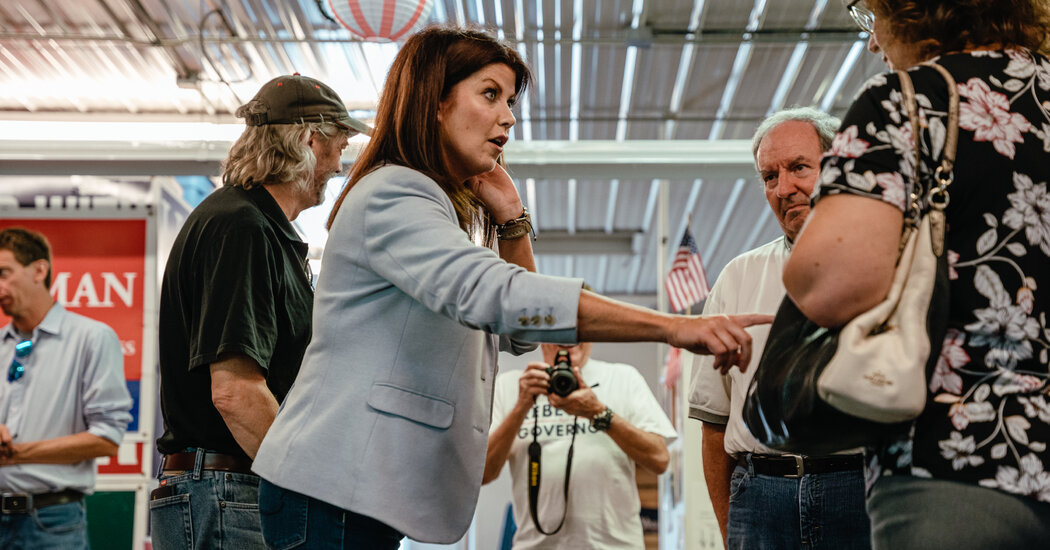
SHEBOYGAN, Wis. — When she started her campaign for governor of Wisconsin, former Lt. Gov. Rebecca Kleefisch, a Republican, acknowledged that President Biden had been legitimately elected.
She soon backtracked. Eventually, she said the 2020 election had been “rigged” against former President Donald J. Trump. She sued the state’s election commission.
But she will still not entertain the false notion that the election can somehow be overturned, a fantasy that has taken hold among many of the state’s Republicans, egged on by one of her opponents, Tim Ramthun.
And for that, she is taking grief from voters in the closing days before Tuesday’s primary.
At a campaign stop here last week, one voter, Donette Erdmann, pressed Ms. Kleefisch on her endorsement from former Vice President Mike Pence, whom many of Mr. Trump’s most devoted supporters blame for not blocking the counting of electoral votes on Jan. 6, 2021. “I was wondering if you’re going to resort to a RINO agenda or an awesome agenda,” Ms. Erdmann said, using a right-wing pejorative for disloyal Republicans.
Ms. Kleefisch’s startled answer — “don’t make your mind up based on what somebody else is doing,” she warned, defending her “awesome agenda” — was not enough.
“I’m going to go with Tim Ramthun,” Ms. Erdmann said afterward.
Ms. Kleefisch’s predicament illustrates how Mr. Trump’s supporters have turned fury over his 2020 election loss and the misguided belief that its results can be nullified into central campaign issues in the Republican primary for governor in Wisconsin, a battleground state won by razor-thin margins in the last two presidential elections. G.O.P. candidates have been left choosing whether to tell voters they are wrong or to engage in the fiction that something can be done to reverse Mr. Trump’s defeat.
Dozens of Republican voters and activists interviewed across the state in the last week said they wanted to see lawmakers decertify the state’s election results and claw back its 10 electoral votes, something that cannot legally be done. Nearly all of them pointed to a July decision from the conservative-leaning Wisconsin Supreme Court, which ruled that drop boxes used to collect ballots during the pandemic were illegal under state law, as evidence that hundreds of thousands of 2020 votes should be thrown out.
“Everybody that I’ve talked to voted for Trump,” said Cyndy Deeg, a food industry worker from Larsen, Wis. “He should be reinstated and resume the position, because he never surrendered it.”
There is no mechanism in Wisconsin law or federal law for a state to retract electoral votes or undo presidential election results two years after the contest, a fact Ms. Kleefisch finds herself explaining to voters, reporters and audiences of televised debates.
Her top Wisconsin ally, former Gov. Scott Walker, said Republicans wanted to move on from discussing Mr. Trump’s defeat two years ago.
“Across the nation, a great many people who love what the president did are starting to grow tired of hearing about 2020 and want to get focused on winning 2022 and 2024,” Mr. Walker said in an interview.
But even as Ms. Kleefisch campaigns on an agenda of restricting voting access and eliminating the bipartisan Wisconsin Elections Commission, two Republican rivals promise to do that and more.
Tim Michels, a wealthy construction magnate who has been criticized for sending his children to school in New York and Connecticut, where he owns a $17 million home, has been endorsed by Mr. Trump and says that if elected, he will consider legislation to decertify the 2020 results. Mr. Ramthun is the state’s leading proponent of decertification, but polling shows him trailing Ms. Kleefisch and Mr. Michels, who are in a tight race.
The winner of the primary will face Gov. Tony Evers, a Democrat who has vetoed more than a dozen voting bills passed by the Republican-controlled Legislature in the last two years. Because of the G.O.P.’s large majorities in the gerrymandered Legislature, a Republican governor would be given a wide berth to change how the state casts and counts votes in the 2024 presidential election.
Mr. Michels, who has blanketed Wisconsin’s airwaves with advertisements reminding voters that he is Mr. Trump’s choice, has learned that running as the candidate backed by the former president comes with certain obligations.
Twice in recent weeks, he has walked back statements that departed from Trump-wing doctrine.
First, Mr. Michels said at a debate that decertifying Wisconsin’s 2020 presidential election results — which Mr. Trump himself has repeatedly urged the top Republican in the State Assembly to do — would not be a priority in his administration. He soon corrected himself, saying that he was “very, very fired up about this election integrity issue” and pledging to consider signing a decertification bill if legislators passed one.
Then, during a town hall-style debate on Monday night, Mr. Michels was asked if he would support a presidential bid by Mr. Trump in 2024.
“I’m focused on this election right now,” he said. “I have made no commitments to any candidates in 2024.”
Trump supporters saw the remarks as a betrayal of the former president, and the next day, Mr. Michels corrected himself.
“The day President Trump announces that he’s going to run for president in 2024, if he does, I will support him and I will endorse him,” he told supporters Tuesday in Kaukauna.
Mr. Michels declined to explain the flip-flop. “I talked about it last night,” he said after the Kaukauna stop, as his aides and supporters physically pushed reporters away from the candidate.
Complicating matters for both Ms. Kleefisch and Mr. Michels is Mr. Ramthun, a state assemblyman whose campaign for governor is scoring low in the polls but held in high regard by the state’s most devoted conspiracy theorists. It was Mr. Ramthun, in February, who pioneered the decertification push after Robin Vos, the Assembly speaker, prevented his proposal for a “cyber-forensic audit” of the 2020 election from coming to a vote.
Mr. Ramthun’s campaign is infused with Christian nationalism, presenting him as a messianic figure who will lead the state to correct what he presents as the injudicious 2020 election results.
“I’m what you’ve been looking for for decades,” he said at Monday’s debate.
Mr. Vos has aggressively tried to restrict voting access in Wisconsin. Along with passing the bills Mr. Evers vetoed, last year he called for felony charges against five members of the state election commission for guidance they issued for voting during the pandemic that he said violated state election law. He also ordered a $1 million investigation into the 2020 election, led by a former State Supreme Court justice, that endorsed debunked conspiracy theories.
But as with Ms. Kleefisch, Mr. Vos’s refusal to allow a decertification vote has exposed him to an attack — in his case, from a primary challenger, Adam Steen, who has no paid staff and barely enough money to print and mail his campaign literature.
Mr. Steen, who was endorsed by Mr. Trump on Tuesday and was given a prime speaking slot at a Trump rally on Friday night in Waukesha, has built his campaign around decertifying the election and has also said he would seek to make contraception illegal.
During a lunch of cheeseburgers and cheese curds, Mr. Steen said he would not have challenged Mr. Vos had Mr. Trump been re-elected.
“Without the knowledge that I have right now, I don’t think I would be running, because it wouldn’t have been exposed,” said Mr. Steen, who drives a Lincoln Town Car with a commemorative license plate from the 2017 presidential inauguration that says “TRUMP.” “I don’t think there was that catalyst to see those problems without him losing.”
Mr. Vos declined to be interviewed. After Mr. Trump endorsed Mr. Steen, Mr. Vos issued a statement reiterating that decertification is impossible.
The party’s grass-roots base is not convinced.
In April, a poll from Marquette University Law School found that 39 percent of the state’s Republicans backed decertification. Since then, momentum for decertification has built, especially after the Wisconsin Supreme Court’s drop box decision. The chairwoman of the Assembly’s elections committee, along with dozens of the state’s county Republican Parties, have called for the election to be decertified.
Dennis Gasper, the finance director of the Sheboygan County Republican Party, which last month passed a resolution calling for legislators to withdraw the state’s 10 Electoral College votes, said he believed elected officials and Ms. Kleefisch were resisting voters’ decertification calls to spare themselves grief in the news media.
“You know, the press is very powerful, and if they would say what they thought, they would be held up as being a little bit crazy,” Mr. Gasper said.
Ms. Kleefisch is left trying to navigate a party that, not long ago, considered her local royalty.
A former Milwaukee television reporter, she was Gov. Scott Walker’s deputy when he led Wisconsin Republicans to revoke most public employees’ collective bargaining rights, a political earthquake in state politics that led to weeks of protests and eventually sapped Democrats’ power here for a generation.
During two interviews last week, she dismissed the ideas that she had crossed Mr. Trump or that his endorsement of Mr. Michels would be decisive. She said she still supported the former president and praised his policies, though she would not commit to backing him in 2024.
But she acknowledged that the issue most forcefully driving Wisconsin Republicans in the current post-Trump era is not grounded in reality.
“I’m not saying that the passion is imaginary, I’m not saying that the mistrust is imaginary,” she said after her Sheboygan stop. “I’m saying the idea that you can disavow the Constitution and statutes and do things that are not articulated anywhere in law is a lost cause, and there’s no path that is articulated to do that.”
Mr. Michels and Mr. Ramthun, she said, are playing with fire by telling voters they’ll deliver something impossible.
“It’s irresponsible to pander,” she said. “You’ve got to tell the truth.”







